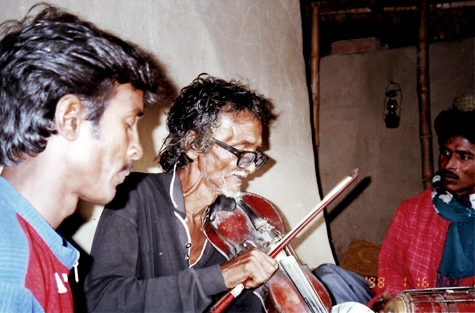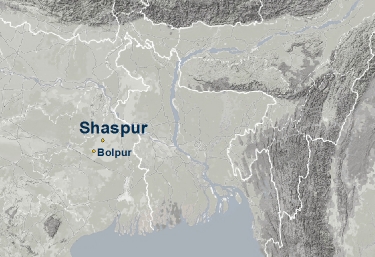Shaspur, Birbhum. 8 January 2005. Golam Shah and sons Salam and Jamir
Golam Shah and sons
Aroj kori o paak bari, 2004
This video was shot by Sudheer Palsane and the audio recording was made by Sukanta at the home of Golam Shah, a fakir from Shaspur in Birbhum. Golam Shah was a little over 60 years, but he looked much older, more so because he had not been keeping well. He had been hospitalised a few times in the recent past, it was probably a heart condition, I don’t really know. Besides, I think that age comes differently to people in different circumstances. When Sukanta and I had gone to his home with Debdas Baul in September 2004, and when he took out his violin and tried to tune the old strings and they kept breaking, I did have a feeling that we were running out of time.
Below is a photo from that session and I have also posted a song we recorded that day. It sounds very familiar, very much like some songs from Bollywood; ‘Bahut pyar karte hain tumko sanam’ comes to mind. Yet the song shows the two-way journey of folk and film songs, of how one influences, and goes into the making of, the other. This sounds like Bollywood, indeed; but where does Bollywood get its songs from? The 1991 Saajan song takes us back to an older Mehedi Hassan song from Pakistan, ‘Bohat khubsurat hai mera sanam’. Small wonder, therefore, that a much-travelled tune like this one should take the form of a Bangla fokiri song; Islam too has journeyed over so many lands, through so many centuries, to reach the eastern ‘frontier’ of Bengal.I am never quite sure what name to call these songs. When sung together in communal gatherings in shrines, they can sound like Bangla versions of North Indian qawwali, but here there are just two singers singing and it sounds more like an individual’s prayer. The Fakir’s prayer, hence a Fakiri song.Serious scholars of form might not agree.

Golam Shah with his sons
Some years ago I had read an autobiographical note by Golam Shah, published in a collection of essays and conversations with bauls and fakirs and scholars of this music. In it Golam Shah had talked about his life as a singer of fakiri songs, about learning to sing from his master Muhammad Shah and about travelling with songs. What had struck me then as it struck me again now was that Golam Shah seemed to have no complaints at all—not against the stark poverty that surrounded him, or against their marginalisation as singers of baul and fakiri songs in an environment of increasing religious fundamentalism and intolerance.
This is one session that touched us very deeply, for the way everything unravelled on that day. The excitement with which Golam Shah fixed new strings on his violin; the way he said to his sons Salam and Jamir that they should give us their best and the way his sons had actually dressed in their best for the occasion; the way Golam Shah began a song and how, when his voice or memory started to fail, Salam gently gave him support, never surpassing him though; the way Golam Shah posed for photographs with his family saying, ‘Take what you like, this is your last chance.’ A big crowd had gathered in his house that day. Here was a man little known to the outside world, yet special in his own place, who commanded deep love and respect of his family and friends for the life of songs and words of comfort he had given to them.
Golam Shah passed away four months after this recording session.
Written in 2010; revised in 2020.
- Saptiguri, North Bengal. 27 November 2003. Nirmala Roy
- Bolpur, Birbhum. 25 November 2003. Nimai Chand Baul
- Kolkata. 4 September 2019. Purnadas on Nabani Das Baul
- Surma News Office, Quaker Street, East London. 27 February 2007. Ahmed Moyez
- Ambikapur, Faridpur, Bangladesh. 29 April 2006. Hajera Bibi
- Sylhet, Bangladesh. 22 April 2006. Chandrabati Roy Barman and Sushoma Das
- Sylhet, Bangladesh. 21 April 2006. Arkum Shah Mazar
- Sylhet, Bangladesh. 20-21 April 2006. Ruhi Thakur and others
- Jahajpur, Purulia. 27 February 2006. Naren Hansda and others
- Faridpur, Bangladesh. 24 January 2006. Binoy Nath
- Uttar Shobharampur, Faridpur, Bangladesh. 22 January 2006. Ibrahim Boyati
- Baotipara, Faridpur, Bangladesh. 21 January 2006. Kusumbala Mondal and others
- Kumar Nodi, Faridpur, Bangladesh. 21 January 2006. Idris Majhi and Sadek Ali
- Debicharan, Rangpur, Bangladesh 18 January 2006 Anurupa Roy & Mini Roy, Shopon Das
- Mahiganj, Rangpur, Bangladesh. 17 January 2006. Biswanath Mahanta & Digen Roy
- Chitarpur, Kotshila, Purulia. 28 November 2005. Musurabala
- Krishnai, Goalpara, Assam. 30 August 2005. Rahima Kolita
- Chandrapur,Cachar. 28 August 2005. Janmashtami
- Silchar, 25 August 2005, Barindra Das
- Kenduli,Birbhum. 14 January 2005. Fulmala Dasi
- Kenduli, Birbhum. 13 January 2005. Ashalata Mandal
- Bhaddi, Purulia. 6 January 2005. Amulya Kumar, Hari Kumar
- Srimangal, Sylhet. 27 December 2004. Tea garden singers
- Sylhet, Bangladesh. 26 December 2004. Abdul Hamid
- Dhaka, Bangladesh. 24 December 2004. Ali Akbar
- Dhaka, Bangladesh. 23 December 2004. Monjila
- Changrabandha, Coochbehar. 16 December 2004. Abhay Roy
- Santiniketan, Birbhum 27 Nov 2004 Debdas Baul, Nandarani
- Tarapith, Birbhum. 14 October 2004. Kanai Das Baul


